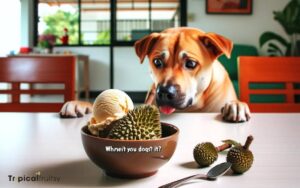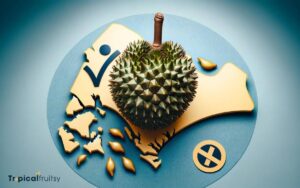Can Dogs Eat Durian Fruit? Explained!
Dogs can eat durian fruit in moderation, but it is crucial to remove the large seeds, monitor the portion size, and observe your dog for any signs of allergy or digestive upset.
Always consult with a veterinarian before introducing new foods to your dog’s diet.
Durian fruit contains sugars, fats, and fibers that can be part of a dog’s diet but must be offered in careful moderation due to its high-calorie content. The large seeds should be avoided as they can cause choking or intestinal blockages.
Vitamins and antioxidants in durian can be beneficial, but the risk of allergic reactions necessitates close observation after consumption.
Ensure a dog’s safety when feeding durian by consulting a vet and adhering to recommended portion sizes.
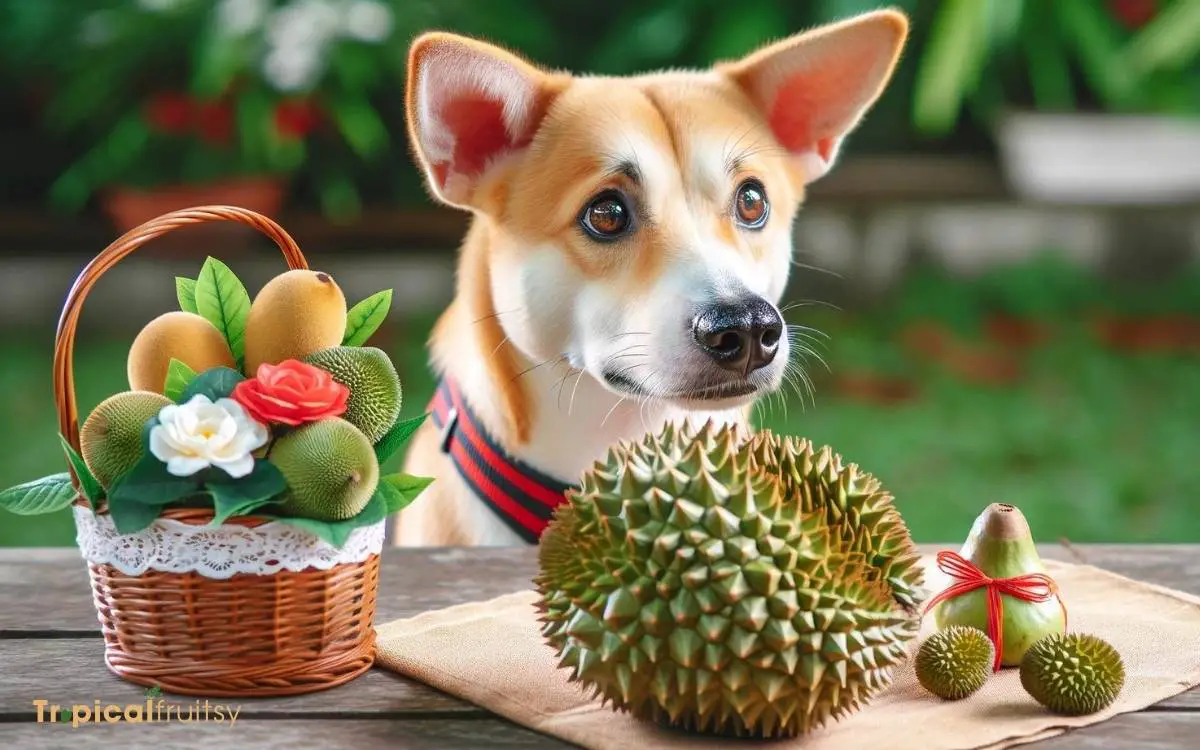
Key Takeaway
Dietary Considerations for Dogs Consuming Durian
| Component | Consideration for Dogs | Action Required |
|---|---|---|
| Seeds | Choking hazard, intestinal blockage | Remove seeds before offering to dogs |
| Sugars | Can lead to obesity, dental issues | Limit portion size |
| Fats | High-calorie content, can cause pancreatitis | Offer in moderation |
| Fibers | Beneficial for digestion | Ensure it doesn’t exceed dietary fiber needs |
| Vitamins | Can be beneficial | No specific action, but offer in moderation |
| Calories | Risk of weight gain | Monitor and control portion size |
| Allergic Reactions | Some dogs may be allergic | Observe closely after feeding |
Understanding Durian Fruit
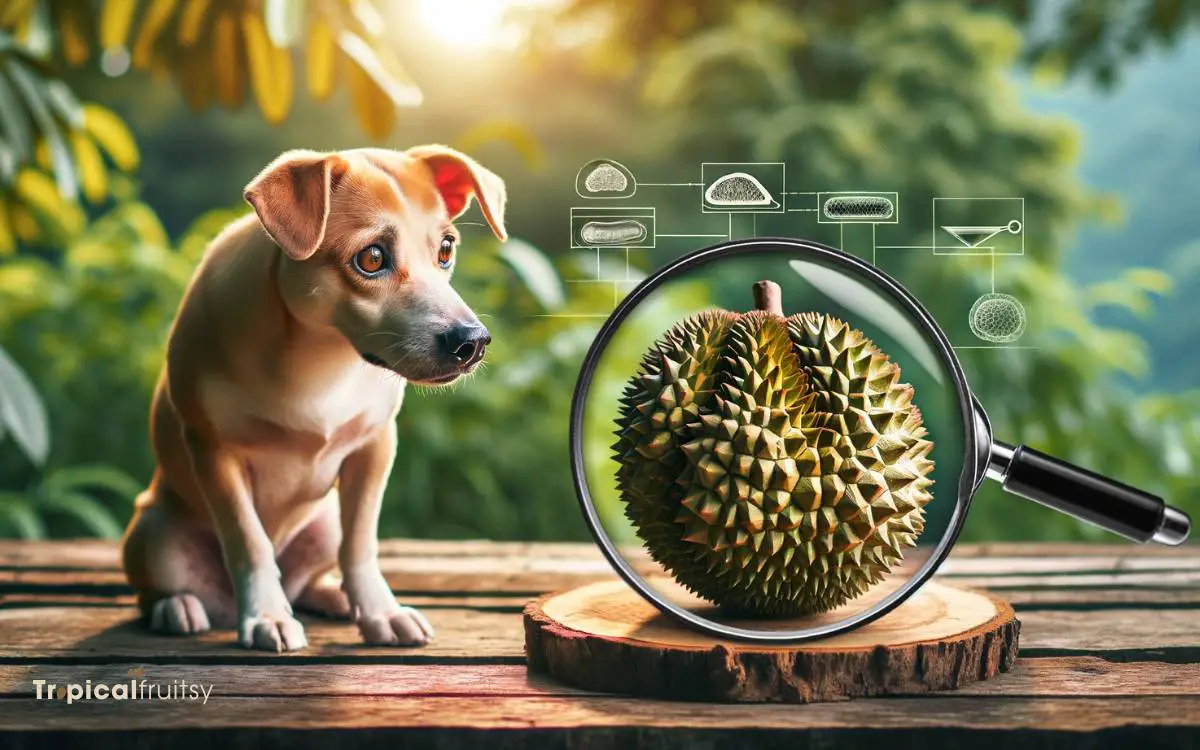
One must first recognize durian as a tropical fruit known for its distinctive odor, formidable thorn-covered husk, and unique taste before considering its suitability for canine consumption.
Originating from Southeast Asia, durian is often referred to as the ‘king of fruits’ and elicits strong reactions due to its pungent smell.
Scientifically classified under the genus Durio, several species exist, but the most commercially available is Durio zibethinus.
The flesh of the fruit, which is the edible part, contains a rich composition of nutrients including carbohydrates, fats, and proteins.
It also provides a significant amount of vitamins and minerals. However, these components must be analyzed rigorously to assess their effects on dogs’ health.
Nutritional Profile Analysis

Commonly, durian fruit’s nutritional profile is rich in carbohydrates, fats, and proteins, which necessitates a careful evaluation of its safety and benefits for canine consumption.
Durian is a calorie-dense fruit, with a significant portion of its caloric content coming from sugars and fats, including saturated fats.
It is also a source of dietary fiber and provides a range of vitamins and minerals such as vitamin C, potassium, and magnesium.
However, the high sugar content can be a concern for dogs, particularly those with diabetes or weight issues.
Furthermore, the fruit’s fat content, while containing healthy monounsaturated fats, can also contribute to gastrointestinal upset in dogs if consumed in large quantities.
Potential Health Benefits

While durian fruit’s high nutritional value may raise concerns for dog owners, it can also offer health benefits, such as boosting the immune system due to its vitamin C content.
Potential Health Benefits for Dogs:
Immune Support:
- Vitamin C is an antioxidant that can help strengthen a dog’s immune system.
- Antioxidants combat free radicals and may reduce inflammation.
Nutritional Contribution:
- Durian is rich in dietary fiber, which can aid in digestive health.
- The presence of B vitamins supports cellular energy production and overall metabolic health.
It’s critical to note that while these benefits could be advantageous, durian should be introduced to a dog’s diet cautiously and in moderation, considering individual health needs and potential allergic reactions.
Recognizing Possible Risks

Despite the potential health benefits of durian for dogs, certain risks must be carefully considered before introducing the fruit into their diet.
Durian contains high levels of fat and sugar, which can lead to obesity or diabetes in canines if consumed in excess.
Additionally, the large seeds pose a choking hazard and could potentially cause intestinal blockages if ingested.
| Risk Factor | Consequence |
|---|---|
| High Fat Content | Weight Gain, Pancreatitis |
| Large Seeds | Choking, Intestinal Blockage |
| Sugar Content | Diabetes, Dental Issues |
Given these risks, it’s imperative to consult a veterinarian before offering durian to your dog. This precaution ensures the safety and well-being of your pet.
Signs of Allergic Reactions
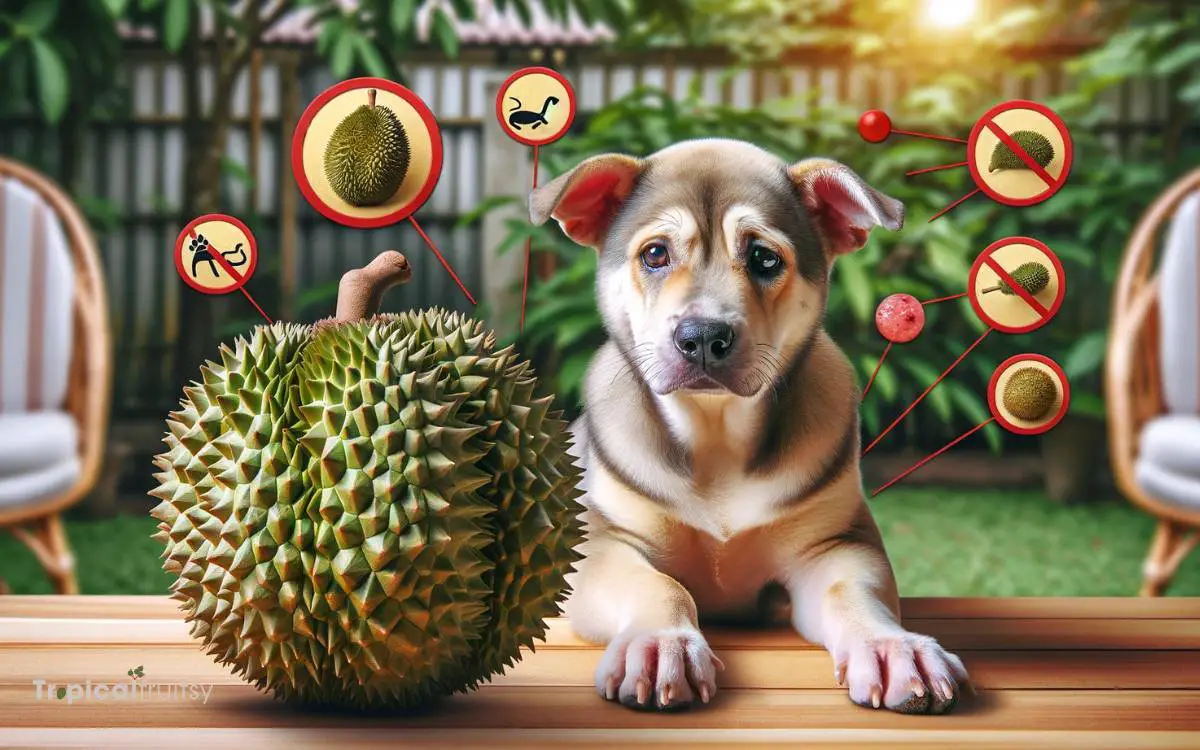
Upon introducing durian into a dog’s diet, vigilant observation for symptoms of allergic reactions is crucial. Allergic responses can manifest in various forms and require immediate attention to prevent complications.
It is important to recognize the signs early and seek veterinary care if any of the following symptoms present:
Physical Indicators of Allergy
Skin Reactions
- Hives or welts
- Excessive itching or scratching
Gastrointestinal Distress
- Vomiting or diarrhea
- Abdominal pain
Respiratory and Systemic Symptoms
Respiratory Distress
- Difficulty breathing or wheezing
- Coughing or sneezing
Anaphylaxis Signs
- Sudden drop in blood pressure
- Collapse
Timely identification and intervention can mitigate these allergic reactions and improve the dog’s prognosis.
Safe Serving Suggestions

Owners considering durian as a treat for their canine companions should adhere to strict serving guidelines to ensure safety and prevent adverse health effects.
Durian, while not toxic, contains high sugar content and can be calorically dense, which could contribute to obesity and related health issues if offered in large quantities.
A safe serving suggestion is to offer small amounts of durian flesh—excluding the seeds, which pose a choking hazard and contain harmful substances—on an occasional basis.
This could equate to a few small bites depending on the dog’s size, age, and overall health. Introducing durian should be done gradually to monitor for any digestive upset or allergic reactions.
Always consult with a veterinarian before adding new foods to your dog’s diet.
Alternative Dog-Friendly Fruits

For those seeking safer and less calorie-dense options, several other fruits make excellent alternatives to durian for dogs. These include apples, blueberries, and bananas, which can be offered in moderation.
These fruits are not only more palatable to most canines but also provide a range of vitamins, minerals, and antioxidants beneficial to a dog’s health.
When introducing these fruits, it’s essential to adhere to the following guidelines:
Apples:
- Core and seed removal is necessary to prevent cyanide poisoning.
- Skin can be left on for added fiber.
Blueberries:
- Serve raw or frozen for a healthy, low-calorie treat.
- High in antioxidants, supporting cellular health and aging.
Bananas:
- Remove the peel due to potential pesticides.
- Offer sparingly due to higher sugar content.
Professional Vet Insights

Veterinarians often caution against feeding dogs durian due to its high fat and sugar content, which can lead to digestive upset and other health issues.
The fruit’s dense nutritional profile, while beneficial to humans in moderation, poses a risk to canines whose digestive systems are not adapted to process such rich foods efficiently.
Moreover, the presence of sulfur compounds in durian, which contribute to its distinctive smell, may cause gastrointestinal irritation in sensitive animals.
Ingestion of large quantities can potentially result in pancreatitis, a serious inflammatory condition of the pancreas.
Given these risks, vets typically recommend adhering to canine-formulated diets and suggesting safer fruit alternatives for supplementary feeding.
When considering any dietary addition, it’s advised to consult with a veterinarian to assess its suitability for an individual dog’s health needs.
Responsible Feeding Practices

Many responsible feeding practices involve offering dogs only a minimal amount of durian, if any, due to its potential health risks.
When considering incorporating new foods such as durian into a dog’s diet, it’s essential to approach this with caution and knowledge of the fruit’s properties and the dog’s dietary needs.
Assessment of Durian for Dogs
- Nutritional Content: High in sugar and fat, which can lead to obesity and pancreatitis.
- Potential Toxins: Sulphur compounds may cause digestive upset or allergic reactions.
- Feeding Guidelines
- Consultation with a Vet: Before introducing durian, ensure it’s safe for your individual dog.
- Limited Quantity: If approved, provide only small, infrequent portions to prevent adverse health effects.
Can Dogs Eat Durian Seeds
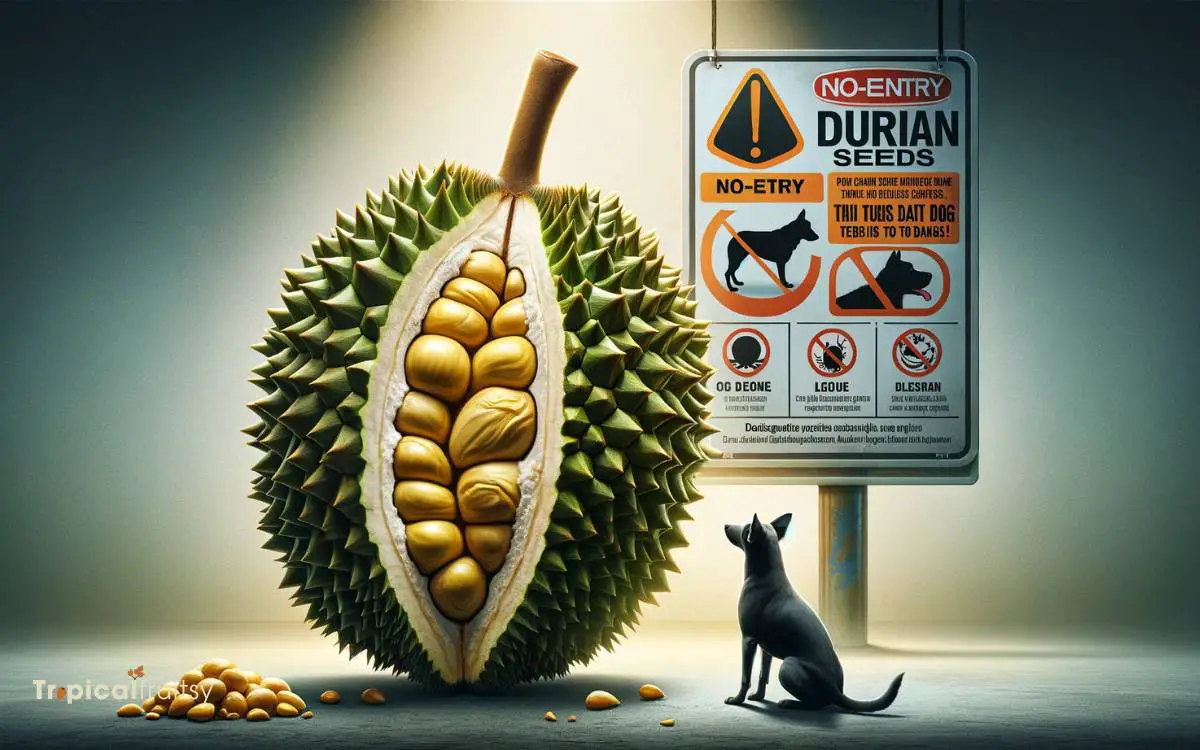
No, dogs should not eat durian seeds. Durian seeds can pose a choking hazard and may cause intestinal blockage in dogs if ingested.
It’s essential to remove the seeds from durian fruit before offering it to your dog to ensure their safety.
While small amounts of durian flesh might be safe for some dogs, it’s always best to consult with your veterinarian before introducing any new food into your dog’s diet to make sure it won’t have any adverse effects on their health.
Additionally, moderation is key when it comes to feeding dogs fruits or other non-standard dog food items.
Conclusion
Durian fruit contains a complex nutritional profile with potential health benefits for canines when consumed in moderation.
However, its high sugar and fat content necessitate caution. Dog owners must be vigilant for signs of allergic reactions and adhere to safe serving guidelines.
Veterinarians emphasize responsible feeding practices to avoid adverse effects. A striking statistic is that durian has about three times the fat content of a banana, emphasizing the need for strict portion control.

